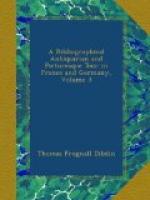It is now high time, methinks, to take leave not only of public and private collections of books, but of almost every thing else in Vienna. Yet I must add a word connected with literature and the fine arts. As to the former, it seems to sleep soundly. Few or no literary societies are encouraged, few public discussions are tolerated, and the capital of the empire is without either reviews or institutions—which can bear the least comparison with our own. The library of the University is said, however, to hold fourscore thousand volumes. Few critical works are published there; and for one Greek or Roman classic put forth at Vienna, they have half a score at Leipsic, Franckfort, Leyden, and Strasbourg. But in Oriental literature, M. Hammer is a tower of strength, and justly considered to be the pride of his country. The Academy of Painting is here a mere shadow of a shade. In the fine arts, Munich is as six to one beyond Vienna. A torpidity, amounting to infatuation, seems to possess those public men who have influence both on the councils and prosperity of their country. When the impulse for talent, furnished by the antique gems belonging to the Imperial collection,[152] is considered, it is surprising how little has been accomplished at Vienna for the last century. M. Bartsch is, however, a proud exception to any reproach arising from the want of indigenous talent. His name and performances alone are a host against such captious imputations.[153] There wants only a few wiser heads, and more active spirits, in some of the upper circles of society, and Vienna might produce graphic works as splendid as they would be permanent.
We will now leave the city for the country, or rather for the immediate neighbourhood of Vienna; and then, having, I think, sent you a good long Vienna despatch, must hasten to take leave—not only of yourself, but of this metropolis. Whether I shall again write to you before I cross the Rhine on my return home—is quite uncertain. Let me therefore make the most of the present: which indeed is of a most unconscionable length. Turn, for one moment, to the opening of it—and note, there, some mention made of certain monasteries—one of which is situated at CLOSTERNEUBURG, the other in the suburbs. I will first take you to the former—a pleasant drive of about nine miles from hence. Mr. Lewis, myself, and our attendant Rohfritsch, hired a pair of horses for the day; and an hour and a half brought us to a good inn, or Restaurateur’s immediately opposite the monastery in question. In our route thither, the Danube continued in sight all the way—which rendered the drive very pleasant. The river may be the best part of a mile broad, near the monastery. The sight of the building in question was not very imposing, after those which I had seen in my route to Vienna. The monastery is, in fact, an incomplete edifice; but the foundations of the building are of an ancient date.[154] Having postponed our dinner to a comparatively late hour, I entered, as usual, upon the business of the monastic visit. The court-yard, or quadrangle, had a mean appearance; but I saw enough of architectural splendour to convince me that, if this monastery had been completed according to the original design, it would have ranked among the noblest in Austria.




